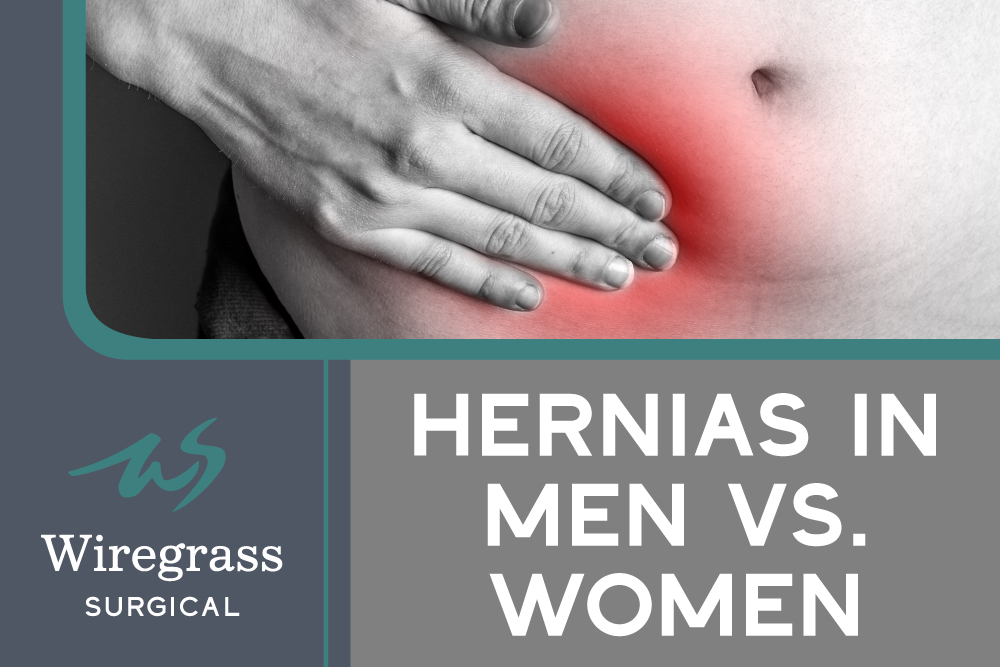
Hernias in Men vs. Women
Did you know that more than five million people in the the United States suffer from a hernia, but only about 15% of them seek medical help each year? Not everyone is aware that certain hernias can cause pain, discomfort and more serious problems if they are not treated.
A hernia is a tear in the muscle or tissue that results in part of your insides bulging out, such as your internal organ or intestines. Depending on the size, you may be able to see and feel the hernia and certain activities, like lifting heavy objects or bending over, can worsen the condition.
What causes hernias?
There are several types of hernias that can all have different causes, however in general a hernia begins with pressure on an organ or your intestines. A hernia forms when this pressure happens in an area where there is weak muscle or tissue. Some people are born with weak muscles or tissues that don’t develop, however most people get hernias as they age and the body naturally weakens. You can also get them from certain habits or movements including:
- Picking up heavy objects
- Overuse of the same muscle
- Being overweight and/or poor nutrition
- Using tobacco
- Straining during coughing, sneezing or constipation
There are several types of hernias including:
- Inguinal hernias: occur in the groin and are most common in men
- Femoral hernias: occur in the upper thigh near the groin. Less common and mostly found in women.
- Ventral hernias: occur in the midline of the abdomen
- Incisional hernias: occur at the site of previous surgical scar tissue
- Umbilical hernias: associated with your belly button and most common in babies
- Hiatal hernias: occurs when part of the upper stomach comes through an opening in the diaphragm or chest wall. Most commonly causes heartburn, indigestion and acid reflux because it can cause acid to leak from your stomach into your esophagus.
- Congenital diaphragmatic hernia: occurs as a birth defect when the diaphragm doesn’t form correctly, allowing the stomach to move into the chest.
Hernias in men vs. women
Certain genders are more susceptible to getting certain types of hernias. For example, inguinal hernias develop more often in men than women, but women are more prone to femoral hernias than men due to the shape of their pelvis.
In women, hernia symptoms can easily be overlooked because hernias in women are usually deeper in the body and bulge less than in men. Also, pelvic pain can be thought to be caused by gynecological conditions like cysts, fibroids or endometriosis. If a woman has had a c-section, incisional hernias are a possible complication, and the risk increases with the number of c-sections each woman has. Compared to a woman with no c-sections, those who had two c-sections had three times the risk. And a woman with five or more c-sections has six times the risk!
In men, inguinal hernias are most common because the weak spot is usually in the inguinal canal where the spermatic cord enters the scrotum. The protruding intestine can descend into a man’s scrotum, causing a swollen and enlarged scrotum and pain that radiates down the inner thigh.
Symptoms of hernias
Man or woman, it’s important to know the commons symptoms of hernias including:
- Visible bulge in affected area
- Pressure and/or pain in the abdomen
- Heartburn, cough and or/difficulty swallowing
- Shooting pain, vomiting and/or constipation
Surgical treatment of hernias
Most hernias will need to be surgically repaired, but not usually immediately. If you have a small or mild hernia, you may be okay to wait and watch it to see if it gets much worse. However, hernias do tend to worsen over time, which is why it is common to repair them.
Hernia repair surgery is considered a major surgery, but it is very common and very safe. Our general surgeons most often can use minimally invasive methods to repair routine hernias, which means smaller incisions, faster recovery and less postoperative pain. Robotic surgery for hernia repair is another approach that our general surgeons can do, using state-of-the-art robotic, computer and optical technologies.
Learn more about robotic vs. laparoscopic hernia surgeries.
Annoyed with a hernia bulge or pain? Call our office today to book an appointment with one of our general surgeons. Wiregrass Surgical Associates can help diagnose your hernia and provide you with treatment recommendations and a surgical plan (if necessary).
